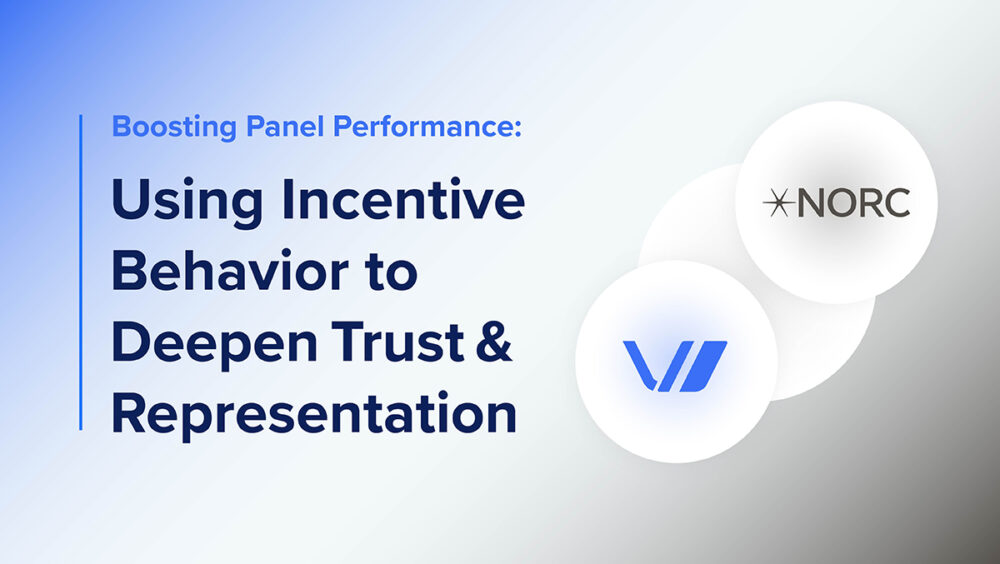NORC’s AmeriSpeak panel is a gold-standard resource for U.S. population research. As participant needs and expectations evolve, NORC recognized the opportunity to deepen engagement through more tailored reward strategies.
Virtual Incentives collaborated with NORC to better understand what participants truly valued. Together, we analyzed thousands of demographic variables to understand their influence on reward choices.
The results elevated NORC’s approach, turning a data study into a blueprint for building trust and creating more representative research experiences.
The Challenge: Strengthening Representativeness Through Participant-Centered Rewards
As AmeriSpeak expanded, NORC recognized the importance of aligning incentives with participants’ varied preferences. The research explored whether more personalized approaches could enhance engagement and panel performance across different demographic groups:
- Participation patterns: Could tailored incentives improve participation across all demographic groups and reduce recruitment challenges?
- Representation opportunities: Would personalized rewards help ensure all communities felt motivated to participate?
- Connection building: Could understanding preferences help create more relevant rewards that strengthen participant engagement?
“People don’t just want to be paid — they want to be seen,” explains Frank Kelly, VP Strategy at Virtual Incentives.
The analysis highlighted the power of behavioral data, showing how redemption patterns can guide more personalized, effective incentives.
The Solution: Using Redemption Data to Drive Balanced Participant Engagement
NORC and Virtual Incentives analyzed thousands of real redemption events to uncover statistically significant patterns in participant preferences. The data revealed strong correlations between reward choice and key demographic factors such as age, income, sex, and race.
These insights demonstrated how, if applied, a rewards catalog could more intentionally align with participant needs and expectations, informing future incentive design for greater fairness and engagement.
The Results: Achieving a More Representative and Engaged Research Panel Through Strategic Incentives
The analysis surfaced actionable insights that deepened NORC’s understanding of panel participation. The data revealed clear generational differences in reward preferences, emphasized importance of financial flexibility, and demonstrated how personal interests shape reward choices:
- 82% of 18–30 year-olds chose gift cards under $51
- 74% of 50–64 year-olds chose $51 or higher
- NH-Black panelists were 67% more likely to choose Mastercard than other groups
- Lifestyle cards like Target, Starbucks, and Xbox showed strong appeal by sex and age
These findings highlighted opportunities to design a more tailored rewards model that reflects participant preferences across demographic groups. It also demonstrates that when participants feel understood and valued through personalized rewards, research quality improves and retention increases.
The Collaboration: Combining Expertise to Advance Engagement
We believe rewards should be based on users and should help define catalog design. This study provides the information needed to enable catalog improvements to help close participation gaps, and it was collaboration that made it possible.
Research methodology experts at NORC joined forces with Virtual Incentives’ behavioral analytics specialists to address a specific challenge: improving panel performance by aligning rewards to better reflect participant needs and close representation gaps.
The collaboration delivered impact for the broader research community:
- Joint research showcased at AAPOR 2025, sharing insights with fellow researchers
- Integrated Virtual Incentives platform data with NORC’s panel engagement goals
- Future experiments may test targeted incentives by demographics to improve personalization and representation
Together, the teams built a model for pairing research expertise with behavioral analytics to elevate participation, creating more representative panels that better serve both researchers and the communities they study.
Interested in exploring behavior-based reward design for your research? Let’s talk about building trust, enhancing performance, and strengthening representation together. [Contact Us]
